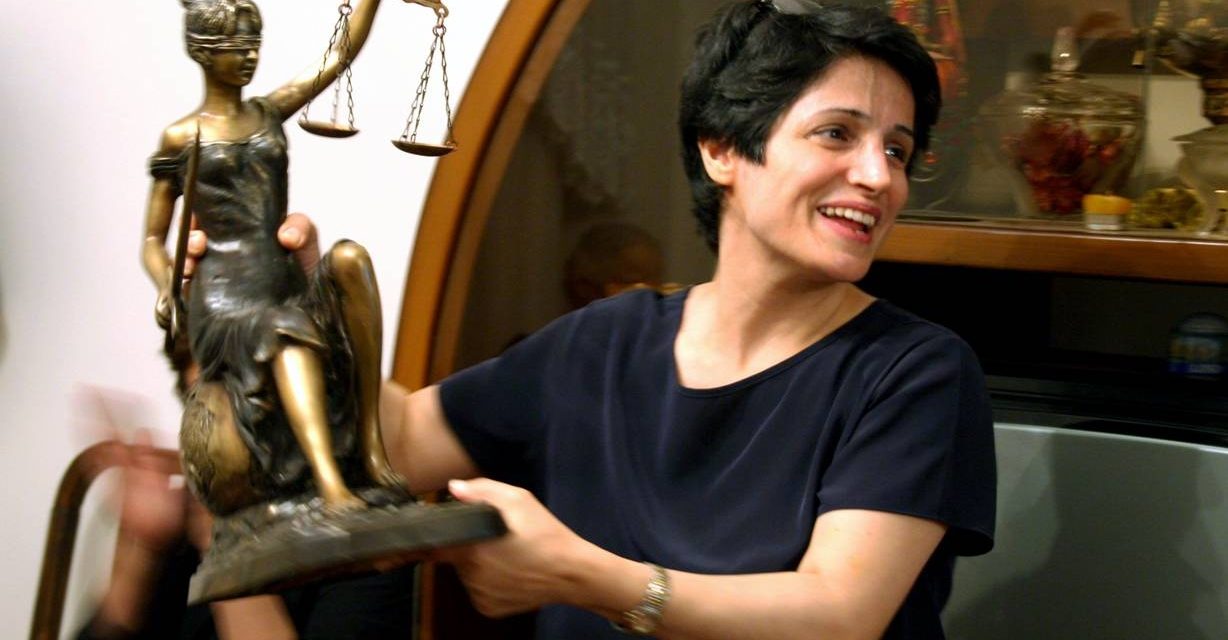Lawyer Nasrin Sotoudeh holding one of her international awards for defense of human rights (File)
Iran’s authorities have finally confirmed the additional sentence imposed on prominent human rights lawyer Nasrin Sotoudeh, setting it at 26 years and 148 lashes.
The official verdict was published after a week of contradictory statements over the punishment of Sotoudeh for representing protesters and women demonstrating against compulsory hijab.
Sotoudeh’s husband Reza Khandan — who is facing a six-year sentence as part of the regime pressure on the lawyer — initially said the human rights activists was given another 33 years on top of the five-year term she is serving. He later amended this to an effective 10-year addition, indicating sentences on multiple charges were concurrent.
Meanwhile, an Iranian official announced that the additional sentence was seven years.
Why is Iran’s Regime So Worried About Political Prisoner Nasrin Sotoudeh?
Iran Daily, March 13: Lawyer Sotoudeh Given Additional 10 Years in Prison
Sotoudeh was imprisoned from 2010 to 2013 for her representation of those demonstrating against the disputed 2009 Presidential election. She was arrested again in June 2018, after she insisted on defending women who publicly took off their hijabs and waved them on the end of poles, in Tehran and other Iranian cities.
Sotoudeh has refused to back down from her right to defend others, leading the authorities to suspend visits with her children and to arrest and sentence Khandan, who is free on bail.
The official verdict converts her legal activity into “national security” charges and manufactures new allegations: “gathering and collusion against national security, propaganda activities against the regime, active membership in an illegal group acting against the regime’s security, encouraging people to corruption and prostitution and providing their means, disturbing public order and peace, spreading falsehoods to mislead the public mind, [and] appearing without hijab before the examining magistrate”.
The document tips off the motive behind the prosecution of Sotoudeh — “the period of unrest in December 2017”, with demonstrations across Iran over economic and political issues — and then condemns Sotoudeh for joining 14 other Iranian intellectuals in a February 2018 call for a referendum on public support for the regime.
The statement criticized Iran’s judiciary for mass detentions of “women, lawyers, journalists, teachers, students, workers, and political and social activists”:
Four decades have passed since the establishment of the Islamic republic, a government whose obsession with Islamisation has left little room for republican ideals.
The verdict then set out Sotoudeh’s “crime” for both representing anti-hijab demonstrators and for removing her own hijab in public.
Sotoudeh did not appear for either her conviction or her sentencing, refusing the authority of the court. Khandan said she will not challenge the new sentences: “She said she wouldn’t want to appeal, and the reason is that the judicial process is unfair and such protests will do no good.”


Ordoo, you are the proof that supporters of this regime are not faithful the anything, you are just an idiot. Keep argue in circles….see how far you get
I was also not aware that English is the official language of the Iranian judicial system.
“To support removal of the hijab in public and to encourage people to taking off their hijab”
No Iranian court – pr Persian speaker for that matter – would ever confuse the headscarf, that covers the head, with hijab which is the practice of veiling. I challenge Iranwire to provide the original Persian text with the official stamp of the court. In 2009, Mohsen Makhmalbaf created a fake memo from the Interior Ministry claiming that Ahmadinejad had received only 5 million votes.
This is FAKE NEWS and has not been reported on any official or semi-official Iranian news media (Iranwire is Maziar Bahari’s dissident site). Sotoudeh’s husband himself has confirmed that the verdict is for 12 years (5 years previous and 7 years for the new sentence and with no lashes): https://www.timesofisrael.com/iran-rights-lawyer-wont-appeal-12-year-sentence/
Murderous and rapist regime at their usual work